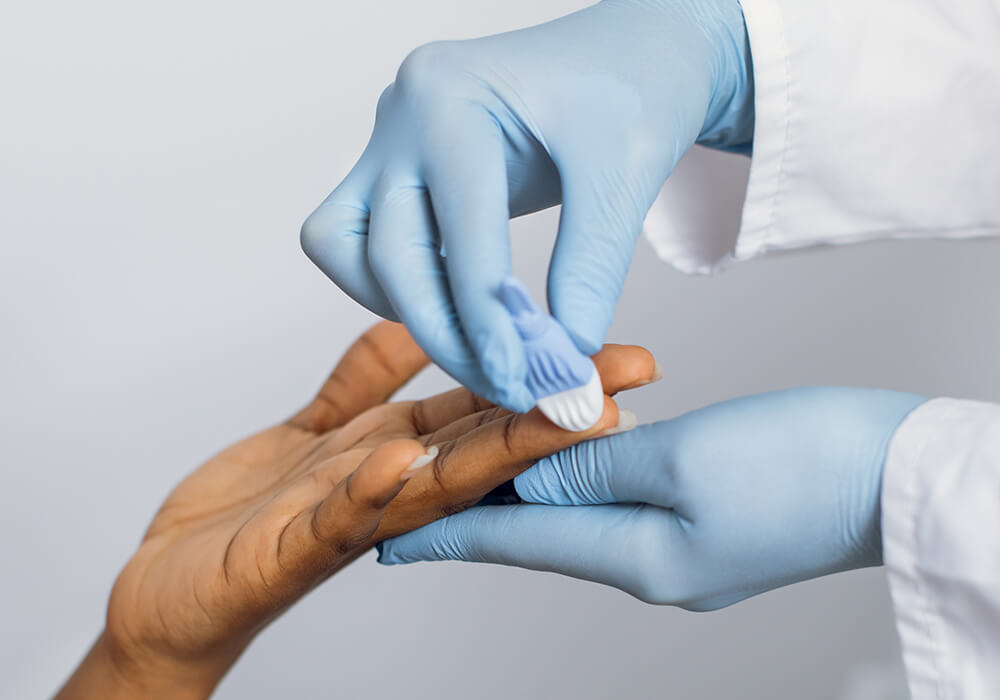STD+HIV Test
Discreetly check for four common sexually transmitted diseases (STDs) from the privacy of your home.
- Detects chlamydia, gonorrhea and trichomoniasis from a urine sample
- Detects HIV-1/HIV-2 antibodies and p24 antigen from a finger prick
- Discreet and private—no need to visit a doctor‘s office.
- All samples processed in a CLIA certified laboratory.
$129.00 Original price was: $129.00.$99.00Current price is: $99.00.
Detailed Description
STDs are infections that are spread from one person to another, usually through sexual contact. STDs are really common, and lots of people who have them don’t have any symptoms. Testing is the only way to know for sure if you have an STD. So if you’ve had any kind of sexual contact that can spread STDs — like vaginal, anal, or oral sex — you may want to consider taking a STD test.
Symptoms of STDs can include sores or bumps in the genital area, strange discharge from the penis or vagina, burning when peeing, and flu-like symptoms like fever and fatigue. STD symptoms can come and go over time, but that doesn’t mean the STD is gone. These symptoms can also be caused by other things, so the only way to know for sure what is happening is to get tested.
Without treatment, STDs can lead to serious health problems.
What are STDs?
Sexually transmitted diseases (STDs) can also be known as sexually transmitted infections (STIs). They are infections that are usually spread from person to person during vaginal, anal, and oral sex. Although many STDs are quite common, a lot of infected people do not show any symptoms, and are unaware that they have an STD and can pass the disease to others. Without treatment, STDs can lead to serious health complications. However, most STDs are easy to test for and can be effectively treated.
How can I prevent STDs?
Avoiding vaginal, rectal or oral sex is the only definite way to prevent catching an STD through sexual contact. Other steps include correct and consistent use of male condoms, and being in a long-term monogamous relationship with a tested partner.
Some of the STDs included in this STD test can also be transmitted through contact with infected blood. Steps to reduce blood transmission include following safe injection practices, avoiding the sharing of injectable drug equipment, and avoiding unregulated tattoo and piercing establishments.
What's Tested?
Chlamydia
Chlamydia is a very common STD in the United States, with about four million cases each year. It is caused by a bacteria called Chlamydia trachomatis, which can infect the genital tract of both men and women. If left untreated, chlamydia can lead to permanent damage to a woman’s reproductive systems. Chlamydia is usually spread through sexual contact, so it’s important to practice safe sex and use protection, such as condoms. Symptoms of chlamydia can range from mild to severe, but many people don’t experience any symptoms at all. That’s why it’s so important to get tested and treated if you think you may have been exposed
Gonorrhea
Gonorrhea is a STD caused by the bacteria Neisseria gonorrhoeae. It can infect both men and women and is especially common in young people ages 15-24 years. Every year in the United States, about 700,000 people get infected with gonorrhea. People who have gonorrhea may not have any symptoms, but if they do, they may have abnormal discharge from the vagina or penis and pain when they pee. If gonorrhea is not treated with antibiotics, it can cause serious problems. Even if a person doesn’t have any symptoms, they can still spread the infection to someone else.
Trichomoniasis
Trichomoniasis is a common and treatable STD caused by a tiny parasite that is usually spread through sexual contact. It‘s estimated that two million people in the United States were infected in 2018, with women being more likely to be infected than men. Most people who have trichomoniasis don‘t have any symptoms. But when symptoms do occur, they can range from mild irritation to severe inflammation. Trichomoniasis can also increase the risk of getting or spreading other STDs, like HIV. Fortunately, trichomoniasis is a curable STD and can be treated with medications.
HIV
HIV is a virus that affects the body’s ability to fight infections. It can be spread through sexual contact, sharing needles, and mother-to-baby contact during pregnancy, childbirth, or breastfeeding. Symptoms of HIV may not appear right away, but can include fever, fatigue, and swollen glands. The only way to know for sure if you have HIV is to get tested. While there is no cure for HIV, there are treatments available that can help people with HIV live long and healthy lives.
How It Works
Step 1. Order your kit
The kit will be delivered discreetly to you. There is no need to leave the comfort of your home.
Step 2. Collect your sample
Activate your kit online, then collect your sample and return it to our lab using the prepaid envelope included in the kit.
Step 3. Receive your results
Your physician reviewed results will be available within 1 to 3 days from your secure online platform.


